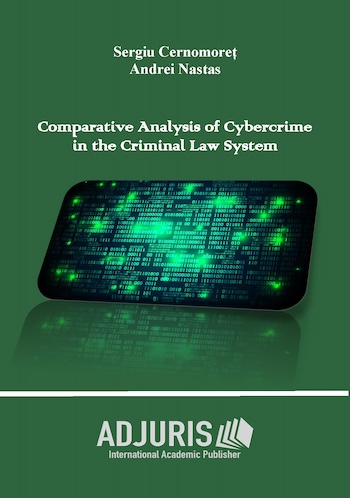Comparative Analysis of Cybercrime in the Criminal Law System
Comparative Analysis of Cybercrime in the Criminal Law System
Contributor(s): Sergiu Cernomoreț (Editor), Andrei Nastas (Editor)
Subject(s): Economy, Law, Constitution, Jurisprudence, Criminal Law, ICT Information and Communications Technologies, EU-Legislation
Published by: ADJURIS – International Academic Publisher
Keywords: Cybercrime Evolution; Legal Harmonization; Moldovan Cyber Regulations; Cyber Sanctions; Comparative Cyber Analysis; Global Cyber Trends; Cybercrime and Pandemics; Cybercrime Prevention
Summary/Abstract: Importance of the topic. In recent decades, information technology has advanced significantly, leading to an increase in cybercrime. These include a wide range of illegal activities such as hacking, phishing, online fraud, cybercrime and more. As a result, cybercrime has become a major issue for the contemporary criminal law system.
Cybercrime is a growing phenomenon in today's digital world, and its consequences can be devastating for individuals and companies. As a result, the criminal law system has developed to combat these crimes and to try to protect society against them.
The development of computers has had, and still has, a major impact on everyday life, on the way business is conducted, on the way information is managed, etc. At the same time, the development of technologies has also led to the emergence of new, highly sophisticated crimes, namely cybercrime. There are many types of such crimes, including computer fraud, computer sabotage, computer forgery, etc., with software piracy accounting for the largest share of these crimes. Criminals in this field, especially hackers, use highly sophisticated software, which makes it virtually impossible to detect them and their attacks cause irrecoverable damage to companies. Computer networks have thus come to occupy a world of their own, in which criminals are in charge, and justice, for the time being, is far removed from this world.
Technological development and the widespread use of information systems has brought with it a number of risks. The increasing dependence of businesses, public institutions and even individual users on the IT systems that largely manage their resources makes them increasingly vulnerable to the impact of cybercrime.
There are many international methods and practices to prevent and combat cybercrime. These include international collaboration, standardisation of investigative practices, use of specialised technology, improved investigative capacity and better legislation.
It is important to recognise that cybercrime is a global phenomenon that requires an international approach and cooperation between governments and law enforcement organisations in order to be effectively prevented and combated.
- Print-ISBN-13: 978-606-95862-1-1
- Page Count: 82
- Publication Year: 2023
- Language: English
- eBook-PDF
- Table of Content

